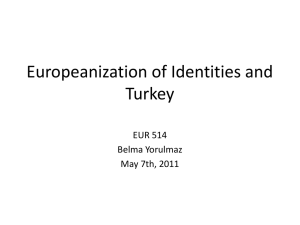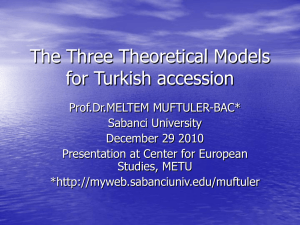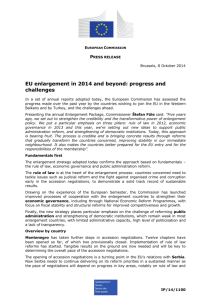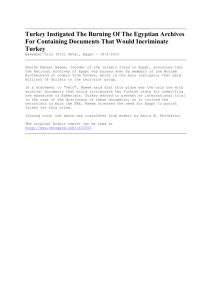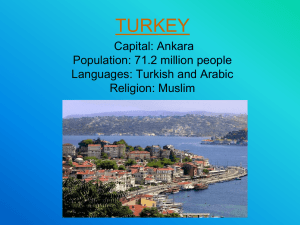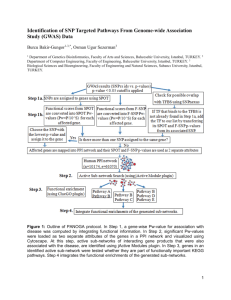PR_PR_08_10_14_ENG
advertisement
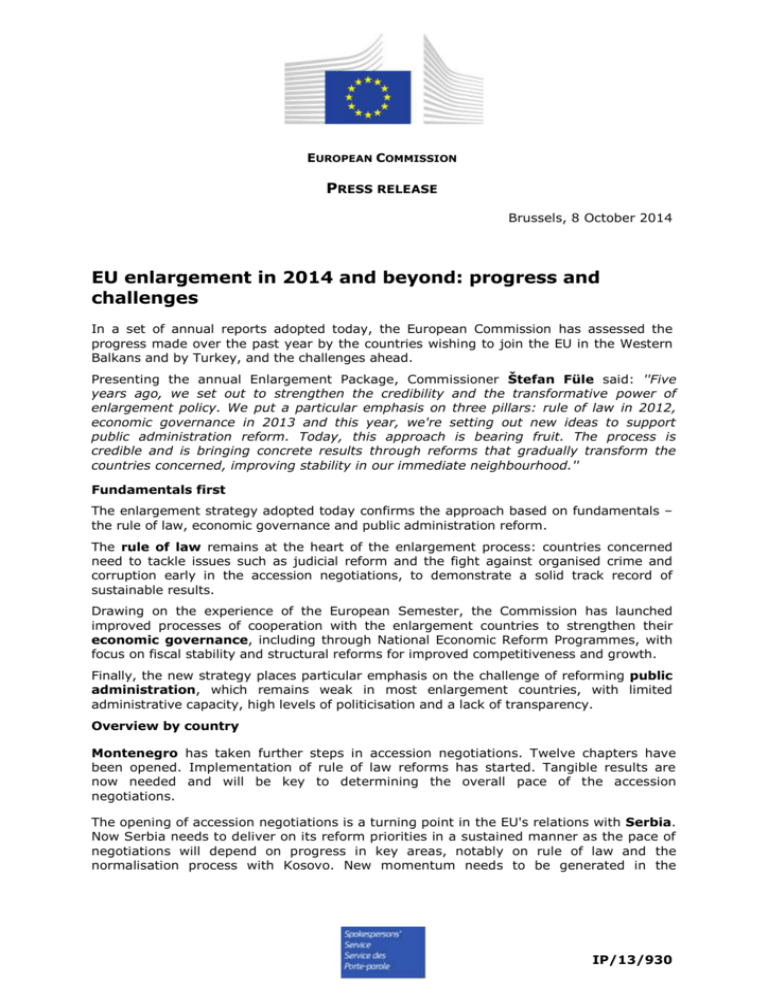
EUROPEAN COMMISSION PRESS RELEASE Brussels, 8 October 2014 EU enlargement in 2014 and beyond: progress and challenges In a set of annual reports adopted today, the European Commission has assessed the progress made over the past year by the countries wishing to join the EU in the Western Balkans and by Turkey, and the challenges ahead. Presenting the annual Enlargement Package, Commissioner Štefan Füle said: ''Five years ago, we set out to strengthen the credibility and the transformative power of enlargement policy. We put a particular emphasis on three pillars: rule of law in 2012, economic governance in 2013 and this year, we're setting out new ideas to support public administration reform. Today, this approach is bearing fruit. The process is credible and is bringing concrete results through reforms that gradually transform the countries concerned, improving stability in our immediate neighbourhood.'' Fundamentals first The enlargement strategy adopted today confirms the approach based on fundamentals – the rule of law, economic governance and public administration reform. The rule of law remains at the heart of the enlargement process: countries concerned need to tackle issues such as judicial reform and the fight against organised crime and corruption early in the accession negotiations, to demonstrate a solid track record of sustainable results. Drawing on the experience of the European Semester, the Commission has launched improved processes of cooperation with the enlargement countries to strengthen their economic governance, including through National Economic Reform Programmes, with focus on fiscal stability and structural reforms for improved competitiveness and growth. Finally, the new strategy places particular emphasis on the challenge of reforming public administration, which remains weak in most enlargement countries, with limited administrative capacity, high levels of politicisation and a lack of transparency. Overview by country Montenegro has taken further steps in accession negotiations. Twelve chapters have been opened. Implementation of rule of law reforms has started. Tangible results are now needed and will be key to determining the overall pace of the accession negotiations. The opening of accession negotiations is a turning point in the EU's relations with Serbia. Now Serbia needs to deliver on its reform priorities in a sustained manner as the pace of negotiations will depend on progress in key areas, notably on rule of law and the normalisation process with Kosovo. New momentum needs to be generated in the IP/13/930 dialogue between Belgrade and Pristina in order to tackle key outstanding issues and open a new phase in the normalisation of relations. The EU accession process with the former Yugoslav Republic of Macedonia is at an impasse. Action is needed to reverse recent backsliding, notably as regards freedom of expression and of the media and the independence of the judiciary. There is an urgent need to find a negotiated and mutually acceptable solution to the name issue. Government and opposition should take steps to restore political dialogue in parliament. Albania was granted candidate status in June as recognition for its reform efforts and progress made in meeting the required conditionality. The country needs to build on and consolidate the reform momentum and focus its efforts on tackling its EU-integration challenges in a sustainable and inclusive way. Bosnia and Herzegovina remains at a standstill on its European integration path. Following the October general elections, it will be essential for the country to speak with one voice, to tackle urgent socio-economic reforms and to progress on its European agenda. The initialling of a Stabilisation and Association Agreement with Kosovo in May is a major milestone in EU-Kosovo relations. Now Kosovo needs to deliver on key reforms, in particular the rule of law. Implementation of certain reform commitments by Turkey has continued, such as the 2013 democratisation package, and steps have been taken towards a settlement of the Kurdish issue. However, there have also been grounds for serious concerns regarding the independence of the judiciary and the protection of fundamental freedoms. Active and credible accession negotiations provide the most suitable framework for exploiting the full potential of EU-Turkey relations. Opening negotiations on the relevant chapters on rule of law and fundamental rights would provide a roadmap for reforms in these key areas. Key findings of the 2014 progress report on Turkey The Commission's 2014 Progress Report on Turkey highlights a number of important steps taken by Turkey over the past 12 months. These steps include: the adoption of law implementing a democratisation package and the Action Plan for the Prevention of Violations of the European Convention on Human Rights, the signature and the entry into force of the EU-Turkey Readmission Agreement and the simultaneous launch of the visa dialogue, as well as the continuation of the process aiming for a settlement of the Kurdish issue. At the same time, the report emphasises a number of concerns. These concerns relate to the adoption of the legislation undermining the independence, efficiency and impartiality of the judiciary, massive reassignments and dismissal of judges and prosecutors and even detention of a high number of police officers, as well as blanket bans imposed on social media. The tendency to pass laws and decisions, including on fundamental issues for the Turkish democracy, in haste and without sufficient consultations of stakeholders is a matter of concern as well. All this stresses the need to engage in an effective dialogue, both within the country and with the EU to ensure that further reforms in the area of the rule of law and fundamental freedoms follow European standards. Political criteria Reform efforts continued, notably several measure under the 3rd and 4th judicial reform packages, as well as measures announced in the September 2013 democratisation 2 package were adopted and implemented. The adoption of an Action Plan on Prevention of European Convention of Human Rights Violations was an important step aimed at aligning Turkey’s legal framework and practice with European Court of Human Rights case-law. The Constitutional Court continued applying the individual application procedure. It took a number of important decisions strengthening the protection of fundamental rights in the country, illustrating the resilience of the country's constitutional system. The parliament also adopted a landmark law providing a legal framework to the process aiming for a settlement of the Kurdish issue. The law strengthens the basis for the settlement process and makes a positive contribution to stability and protection of human rights in Turkey. However, specific developments in the area of the judiciary and freedom of expression were a matter of concern. Amendments – later reversed - to the Law on High Council of Judges and Prosecutors and subsequent dismissal of staff, as well as numerous reassignments of judges and prosecutors raised serious concerns over the independence, efficiency and impartiality of the judiciary, respect for the rule of law and the separation of powers. Legislation limiting freedom of expression, including the Law on Internet, was adopted and the effective exercise of this freedom was restricted in practice, exemplified by blanket bans on YouTube and Twitter – even if these were later overturned by the Constitutional Court. The political climate was marked by polarisation. Several pieces of legislation proposed by the ruling majority, including on fundamental issues for the Turkish democracy, were adopted without proper parliamentary debate or adequate consultation of stakeholders and civil society. These issues underline the importance for the EU to enhance its engagement with Turkey on rule of law issues. It is in the interest of both Turkey and the EU that the opening benchmarks for chapters 23 – Judiciary ad Fundamental Rights, and 24- Justice, Freedom and Security, are agreed upon and communicated to Turkey as soon as possible, with a view to enabling the opening of negotiations under these two chapters. With regard to regional issues and international obligations, Turkey supported the resumption of the fully-fledged settlement talks between the leaders of both communities in Cyprus under the good offices of the UN Secretary-General. Turkey is expected to follow up this support with constructive statements and concrete action. In addition, Turkey has still not complied with its obligation of full non-discriminatory implementation of the Additional Protocol to the Association Agreement. Economic criteria Turkey is a functioning market economy. After slowing down to an annual GDP growth of 2.2% in 2012, the Turkish economy re-accelerated to 4% in 2013. However, unemployment has risen as a result of a strongly expanding labour force. The current account deficit has remained at an elevated level. Turkey's recent economic performance illustrates both the high potential and continuing imbalances of its economy. On the external side, the continued reliance on capital inflows to finance a shrinking but still large structural current account deficit makes Turkey vulnerable to changes in global risk sentiment, resulting in large exchange rate fluctuation and boom-bust cycles in economic activity. Relatively high inflation continues to be a major challenge. A rebalancing of the macroeconomic policy mix would be helpful to ease the burden on monetary policy. For the medium to longer term, it is essential that the functioning of the markets for goods, 3 services and labour are improved through structural reforms to increase international competitiveness. These reforms should be coupled with improvements in the judicial system and of administrative capacity, enhanced transparency of state aid, and open, fair and competitive public procurement system. EU legislation Turkey's alignment efforts with the acquis continued. In 2013, another negotiation chapter was opened. Progress was particularly noticeable on trans-European networks; and in key areas under chapter 24, in particular migration and asylum policy. The implementation of the EU-Turkey readmission agreement and of the Roadmap towards a visa-free regime is expected to continue. Further significant progress is needed especially in the area of on judiciary and fundamental rights, social policy and employment, in particular in the areas of labour law and health and safety at work. State of play on accession negotiations EU accession negotiations with Turkey began on 3 October 2005. In total, 14 out of 33 negotiation chapters have been opened, and one of the open chapters has been provisionally closed. As a result of Turkey not having fully implemented the Additional Protocol to the Association Agreement, the EU decided in December 2006 that eight negotiating chapters could not be opened and that no chapter could be provisionally closed until Turkey meets its obligations. Key dates September 1959: Turkey applies for associate membership of the European Economic Community (EEC) September 1963: Signature of the Association Agreement, aiming at enhancing economic cooperation and achieving a Customs Union between Turkey and the EEC April 1987: Turkey presents its formal application for membership of the European Economic Community January 1995: Turkey - EU Agreement creating a customs union December 1999: the European Council recognises Turkey as a candidate country December 2004: The European Council agrees to start accession negotiations with Turkey October 2005: Start of accession negotiations December 2006: The Council decides that 8 negotiating chapters cannot be opened and no chapter can be closed until Turkey meets its obligation of full, non-discriminatory implementation of the additional protocol to the Association Agreement May 2012: European Commission and Turkey start the implementation of the Positive agenda for Turkey November 2013: Chapter 22 on Regional Policy and coordination of structural instruments becomes the 14th chapter on which negotiations are opened December 2013: the EU-Turkey readmission agreement is signed in parallel with the launching of the visa liberalisation dialogue. October 2014: the EU-Turkey readmission agreement enters into force. More information at: 4 http://ec.europa.eu/enlargement/countries/strategy-and-progress-report/index_en.htm Background MONTENEGRO: candidate - applied in 2008, obtained candidate status in 2010. Accession negotiations were opened in June 2012. Twelve negotiating chapters have been opened, of which two provisionally closed. The screening process was completed in May 2014. The rule of law chapters, chapter 23 (judiciary and fundamental rights) and 24 (justice, freedom and security) were opened in December 2013, after Montenegro adopted comprehensive action plans for these chapters. SERBIA: candidate - applied in 2009, obtained candidate status in March 2012. The EUfacilitated dialogue between Belgrade and Pristina was launched in March 2011. The First agreement of principles governing normalisation of relations was reached between Belgrade and Pristina in April 2013. The momentum of reforms has also been reinvigorated in Serbia. The European Council decided in June 2013 to open accession negotiations and the first Intergovernmental Conference on Serbia's accession negotiations was held in January 2014. The EU accession negotiations are now underway. The analytical examination of the acquis, or screening process, is ongoing and is planned to be completed in March. The Stabilisation and Association Agreement (SAA) entered into force on 1 September 2013. THE FORMER YUGOSLAV REPUBLIC OF MACEDONIA: candidate since 2005. The country continues to sufficiently meet the political criteria and it is at a high level of alignment with the EU acquis. The Commission maintains its recommendation to open accession negotiations, but regrets the backward steps of the past years. Decisive action is needed to address concerns about increased politicisation and growing shortcomings with regard to the independence of the judiciary and freedom of expression so that its recommendation can be sustained in future years. It is responsibility of both government and opposition to ensure that political debate takes place primarily in parliament and to contribute to creating the conditions for its proper functioning. The Commission has recommended six years in a row that accession negotiations be opened. The Council has not yet taken a decision on this. The Commission believes that if screening and the Council discussions on the negotiating framework were under way, this process would have also contributed to creating the conditions to finding a negotiated and mutually accepted solution to the name issue. ALBANIA: candidate - applied in 2009; granted candidate status in June 2014, based on the Commission's assessment that Albania continued to implement and consolidate reforms, in particular in judiciary and the fight against organised crime and corruption. Work on this has continued, with major operations against drug-related crimes. For opening accession negotiations, Albania will need to consolidate and intensify reforms in key priority areas, notably as regards the rule of law. It is responsibility of both government and opposition to ensure that political debate takes place primarily in parliament and to contribute to creating the conditions for its proper functioning. BOSNIA AND HERZEGOVINA: potential candidate - has a European perspective like the rest of the Western Balkans. Country remains at a standstill in the European integration process with the Stabilisation and Association Agreement still not in force. Bosnia and Herzegovina’s leaders need to decisively engage in a comprehensive reform agenda after the October general elections. They need to address the socio-economic concerns of the citizens and improve efficiency and functionality of institutions at all levels of government as well as the coordination between them, necessary to progress on the EU path. 5 KOSOVO: potential candidate – shares a European perspective with the rest of the Western Balkans region. The EU-facilitated dialogue between Pristina and Belgrade was launched in March 2011. The First agreement of principles governing normalisation of relations was reached between Pristina and Belgrade in April 2013. Negotiations on a Stabilisation and Association Agreement with Kosovo were concluded and the agreement was initialled in July 2014. TURKEY: candidate - applied in 1987. Accession negotiations started in October 2005; 14 chapters are opened of which one provisionally closed. Chapter 22 – regional policy and coordination of structural instruments, was officially opened in November 2013. The Commission underlines the importance for the EU to enhance its engagement with Turkey, so that it remains the benchmark for reforms in the country. ICELAND: following a decision of the Icelandic government, accession negotiations have been put on hold since May 2013. More information The documents can be found at: http://ec.europa.eu/enlargement/countries/strategy-and-progress-report/index_en.htm Contacts : Peter Stano (+32 2 295 74 84) Anca Paduraru (+32 2 296 64 30) 6
